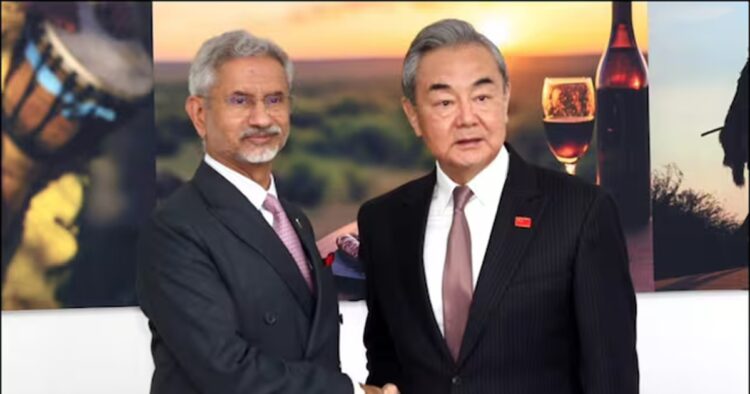External Affairs Minister S. Jaishankar met with his Chinese counterpart, Wang Yi, on the sidelines of the G20 Foreign Ministers’ Meeting in Johannesburg, South Africa. Their discussions centered on restoring mutual trust, strengthening bilateral cooperation, and addressing longstanding border tensions.
This high-level engagement comes at a crucial time, as India and China continue diplomatic efforts to stabilize relations after recent border disputes. The meeting occurred amid continued efforts to ease border tensions, especially in eastern Ladakh.
India and China recently finalized the disengagement process at the Depsang and Demchok friction points, a key step toward de-escalation.
Strengthening Bilateral Relations
During the meeting, Wang Yi emphasized that “the restoration of mutual trust and the realization of win-win cooperation between India and China meet the shared expectations of both peoples.” He recalled the 2023 meeting between Prime Minister Narendra Modi and Chinese President Xi Jinping in Kazan, which he described as a pivotal moment for improving ties.
Wang noted that exchanges at all levels have since resumed and that special representatives for border issues have agreed on a framework to manage differences.
EAM Jaishankar acknowledged the significance of the PM Modi-President Xi meeting, stating that it had provided important guidance for rebuilding bilateral relations. He highlighted India’s commitment to restoring cooperative mechanisms, enhancing cultural and people-to-people exchanges, and maintaining peace in border regions.
“Building mutual trust between India and China is in the interests of both sides,” he said, emphasizing the need for continued engagement.
Progress on Border Disengagement
The meeting took place amid ongoing efforts to resolve border tensions, particularly in eastern Ladakh. India and China recently completed the disengagement process at the Depsang and Demchok friction points, marking a significant step toward de-escalation. This progress followed the October 23 discussions between PM Modi and President Xi in Kazan, where both leaders agreed to revive dialogue mechanisms to prevent future conflicts.
The timing of EAM Jaishankar’s meeting with Wang also gained significance following US President Donald Trump’s offer to mediate between India and China. During a recent briefing with PM Modi at the White House, Trump stated, “I do see the skirmishes on the border, which are quite vicious, and I guess they continue to go on. If I could be of help, I would love to help as that should be stopped.”
However, India reiterated its long-standing position that border disputes with China must be resolved bilaterally.
Future of India-China Cooperation
Looking ahead, Wang Yi expressed China’s willingness to work with India to commemorate the 75th anniversary of diplomatic relations. He described this milestone as an opportunity to inject new momentum into bilateral ties. Both sides acknowledged that as neighboring major countries and ancient civilizations, fostering cooperation would benefit not just their nations but the broader region as well.
EAM Jaishankar’s visit to South Africa for the G20 Foreign Ministers’ Meeting reflects India’s broader diplomatic engagement on global and regional issues. His discussions with Wang underscore the ongoing efforts to stabilize India-China relations, with both nations recognizing the importance of dialogue, trust-building, and peaceful coexistence.

















Comments